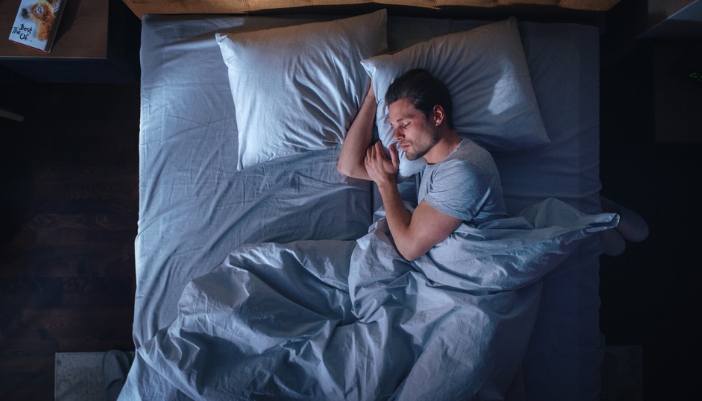It starts the same way every night — the promise of “early to bed.” Then somehow it’s 11:47 p.m., your brain’s replaying your entire to-do list, and you’re staring at the ceiling like sleep is just ignoring you on purpose.
The real problem? It’s usually not the big stuff. It’s the quiet, everyday habits that feel harmless — but quietly throw your sleep off track. The good news: fixing them doesn’t mean an overnight overhaul. Even one small change can reset your rhythm and help your body remember how to truly unwind.
Our experts at Appliance Center are here to walk you through what’s secretly stealing your sleep — and show you the easy tweaks that actually make a difference.

The Good Intentions That Backfire
You’re doing everything right… or so you think. You’ve traded your 5 p.m. coffee for a 7 p.m. workout, poured yourself a “sleepytime” glass of wine, and promised to be in bed by 10. Yet somehow, you’re still wide awake at midnight, wondering why your brain won’t clock out.
Here’s the truth: some of the habits we think are helping us unwind are actually disrupting our sleep cycles.
- That “harmless” nightcap: Sure, wine helps you doze off faster — but it also disrupts REM sleep, the stage where your brain and body recharge. Translation: you’ll wake up groggy, not refreshed.
- Late-night workouts: Exercise is excellent for stress and energy, but not so great an hour before bed. The post-workout adrenaline rush and higher body temperature can delay your ability to drift off.
- Afternoon caffeine sneaking into the evening: Even if you swear coffee doesn’t “affect you,” caffeine can stay in your system up to 8 hours. That 3 p.m. latte might still be lighting up your nervous system at bedtime.
Easy Fix:
Enjoy your wine or workout earlier — aim for before sunset — and cut caffeine by mid-afternoon. Your sleep cycles will thank you.
The “Just One More Thing” Trap
You know that feeling when you’re so close to calling it a night — and then suddenly, you’re knee-deep in tomorrow’s emails or “just one more” episode of your show? Yeah… that’s the trap. It starts innocently and ends with you calculating how few hours you can sleep without ruining your morning.
We tell ourselves these late-night extras are harmless — productive, even. But each “one more thing” hits pause on your body’s natural shutdown sequence.
- Doomscrolling before bed: You’re lying down, so technically you’re “relaxing,” right? Except your brain is digesting 47 news headlines and three celebrity scandals — not exactly restful content.
- Checking work emails: It feels responsible, but mentally clocking back in at 10 p.m. sends your stress hormones into overdrive. Let’s be honest — no one’s giving out awards for late-night inbox checks.
- “Background” TV or streaming: That sitcom rerun isn’t as harmless as it seems. The flashing light and sound stimulation tell your brain it’s party time, not sleep time.
Easy Fix:
Set a nightly “digital clock-out” — no screens, emails, or planning 30 minutes before bed. Let your brain get bored enough to power down.

The Environment You’ve Normalized
Sometimes, it’s not you—it’s your bedroom. Over time, we start to accept little things that quietly wreck our rest: the faint glow from a charger light, the pile of unfolded laundry in the corner, the mattress that’s seen better decades.
Your environment sends constant signals to your brain. If your bedroom whispers “chaos” instead of “calm,” your body won’t fully relax — no matter how many chamomile teas you sip.
- Visual clutter = mental clutter: That stack of clothes you “swear” you’ll put away tomorrow? It’s screaming unfinished business at your half-asleep brain.
- Wrong mattress or pillow: Too soft, too firm, too old — whatever the issue, discomfort means more tossing, more turning, and a lot less real rest.
- Temperature and light: A room that’s too warm or bright tells your body it’s still daytime. Cooler temps (around 65–68°F) and darkness cue your sleep hormones to kick in.
Easy Fix:
Treat your bedroom like a sleep zone, not a storage unit. Declutter what you can, dim the lights, and invest in comfort that actually supports you.
The Daytime Domino Effect
Bad sleep doesn’t start at bedtime — it starts long before your head hits the pillow. Your choices during the day can quietly tip over a row of sleep-related dominoes by nightfall.
Maybe you skipped your morning walk or spent all day indoors under fluorescent lights. Maybe you stayed glued to your chair until dinner and wondered why your body didn’t feel tired later. It’s not laziness — it’s biology.
- No morning sunlight: Your circadian rhythm needs daylight like your phone needs Wi-Fi. Without that morning light signal, your body clock gets confused about when to feel sleepy.
- Not enough movement: A sedentary day means your body never earns that deep, “I’m exhausted” kind of rest. Even light movement — a walk, a stretch, a dance break — helps set you up for better sleep.
- Inconsistent sleep schedule: Staying up late and sleeping in on weekends feels great — until Monday hits and your body’s like, “Wait, what timezone is this?”
Easy Fix:
Step outside early for sunlight, move your body during the day, and keep your sleep schedule within an hour — even on weekends.

No More Midnight Mayhem
Good sleep isn’t about perfection — it’s about progress. Change one small habit, feel one big difference. Then build from there. Before long, your nights feel calmer, your mornings clearer, and your coffee a little less critical.
When you’re ready to fine-tune your comfort setup, our experts at Appliance Center are here to help. Stop in with your shop a selection, test out what feels right, and sleep questions designed to work with your better habits — not against them.
Because when your habits and your mattress finally agree, the only thing left to decide is which side you’re sleeping on.

